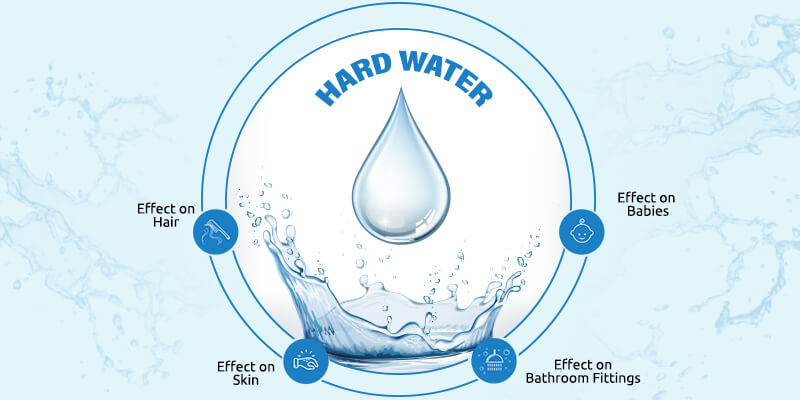You probably won’t think much about how hard your water is unless it has an impact on your life. But if you have ever noticed how your hair or skin reacted differently to something when you switched utilities, you’ll understand exactly what we mean. That said, not everyone has a choice about what kind of water they use at home. Sometimes it just is what it is. So even though it’s not something that most people give a lot of thought to, knowing whether you have hard or soft water can make a big difference when it comes to your beauty routine and skincare routine. Keep reading for more information on the differences between hard and soft water and how each one impacts your hair and skin!
How Does Hard Water Affect Your Hair?

If you are using hard water to wash your hair, you’re likely to notice that your hair is more frizzy and coarse because of the minerals present in the water. These minerals cause of the water to change and deposit in the hair follicles, causing the hair shaft to swell and
become more “coarse”. Over time, this can lead to changes in the structure of the hair, which can lead to breakage and a reduction in volume, as well as increased frizz and difficulty styling. While you can’t change your water source, there are a few things you can do to help mitigate the damage caused by hard water. One of the best ways to help combat the damage caused by hard water is to use a clarifying shampoo at least once a month, or every few weeks if you have particularly curly or thick hair. Clarifying shampoos are formulated to help remove the minerals that are causing damage. The minerals, as well as other impurities like product buildup, will be removed from the hair, leaving it smooth and manageable. Also, it’s a good idea to use a conditioner every time you wash your hair, even if you use a clarifying shampoo. Conditioners help to protect your hair from these minerals, as well as prevent tangles, which can lead to more breakage if you don’t take
care of them properly. If you love the way your hair looks and feels when you use hard water, there’s no need to switch, but if you notice any negative changes, you can do a few things to help mitigate the damage caused by hard water.
How Does Hard Water Affect Your Skin?

If you have hard water, you’re likely to notice that your skin is drier and has more impurities than people who have soft water. In addition to having a lower pH, hard water also has a higher mineral content, which can make it harder for your skin to “breathe”. For people with dry skin, this can actually be a good thing, since it can provide additional hydration, but for people who have oily or combination skin, the additional minerals can lead to breakouts, impurities, and a reduction in the skin’s ability to retain moisture, which can cause dryness.
If you have oily or combination skin and live in a complex water area, chances are you are already well aware of the damage hard water can cause to your skin. Most people with oily or combination skin will experience a reduction in oil production as they age, but if you’re using hard water, that can happen much sooner. As far as concerns related to impurities and the “hardness” of the water, soft water can actually be more problematic. While hard water can leave an oily residue behind on your face, which can block pores, soft water can actually
cause an increase in impurities and leave your skin drier.
The Difference Between Hard and Soft Water for Hair

The minerals present in your water can also affect how your hair feels and looks, but the hardness of your water will also affect the pH of your shampoo. So if you have hard water, you’ll want to look for a shampoo that has a high pH to counteract the pH of the water, so
you don’t end up with a shampoo that actually makes your hair more coarse. You can also use a clarifying shampoo every once in a while to help remove impurities like product buildup and minerals from hard water. But if you have hard water, you’ll want to look for a shampoo that has a high pH, as well as a low sulfate content, since that is what actually helps to clean the hair and prevent buildup. Soft water, on the other hand, is much more gentle on your hair, but you may notice that it’s harder to lather up, which can make it harder to remove impurities and product buildup. Soft water is also more likely to leave behind a film on the hair, which can make it feel
greasier than it would if you used a shampoo with a higher pH.
The Difference Between Hard and Soft Water for Skin
The minerals present in your water will also affect the pH of your cleanser, which can, in turn, affect the health of your skin. If you have soft water, you’ll likely have a cleanser with a high pH, which can be drying and cause redness, irritation, and a reduction in hydration. But if you have hard water, you’ll be more likely to have a cleanser with a low pH, which can actually cause oily skin, pimples, and clogged pores. The best thing you can do for your skin is to use a cleanser that has a pH that’s in the middle: 5.5-7.0. That way, you can help to maintain the best pH for your skin and keep it healthy and balanced. If you have oily skin and live in a hard water area, you are probably well aware of the damage hard water can cause to your skin. Most people with oily skin will experience a reduction in oil production as they age, but if you’re using hard water, that can happen much sooner. So, Which is Better for Hair and Skin? While it’s true that hard water is more likely to leave your hair and skin drier, while soft water can leave behind an oily residue, there are ways to combat the issues associated with each type of water. Ideally, you would be able to switch to a different water source, but for whatever reason, you may not be able to. In that case, there are ways to combat the issues associated with each type of water.
Using a clarifying shampoo once a month, or every few weeks if you have particularly curly or thick hair, can help to remove impurities and mineral buildup from the hair. Using a cleanser with a pH that’s in the middle can help to keep your skin healthy and balanced. All things considered, there are benefits and drawbacks to both types of water, and the best thing you can do is to make sure you’re taking care of your hair and skin by using products that are right for you.
Bottom Line
When it comes to hard water versus soft water, it’s important to remember that it doesn’t matter which type of water you have if you don’t take care of your hair and skin. Whether you have hard water or soft water, you can make sure your hair and skin are properly hydrated and healthy by using the right products for your specific hair and skin type.

